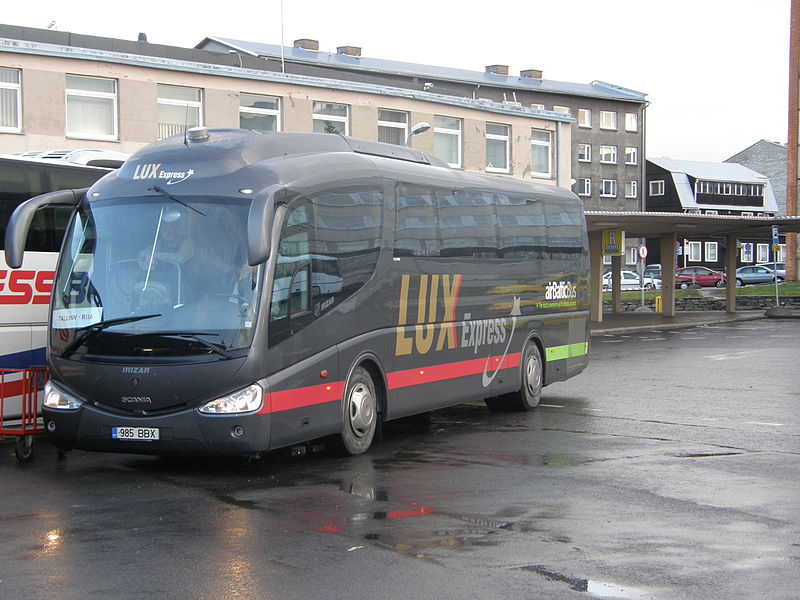Is Interrailing really worth it?
/One of Poland's PKK Intercity Express trains. Image credit: Maciek Lulko/Flickr
A few years ago I was intrigued by the idea of Interrailing. I know people that have done it, and it has allowed them to experience several different European countries or, in some cases, experience a multitude of places within one country.
For those who aren’t familiar with it all, Interrail are a company who sell train passes to travellers from all over the globe. According to their website, they are “the joint Interrail webshop of 32 European railway companies.” With plenty of cross-country train journeys spanning the continent the possibilities – to be cliché – are virtually endless.
Currently, there are two types of pass that Interrail have on offer, which are:
Global Pass (Starting from £144) – This enables travellers to go from country-to-country, sometimes with specific limitations. The cheapest Interrail Global Pass costs £144 and allows the bearer to travel for five days within ten days.
That sounds confusing, but the explanation found on Interrail.eu states: “five days within ten days – this means you can choose any five days to travel on within a period of ten days.
The travel days do not have to be consecutive. You can decide when to use them during your trip. A pass like this is ideal if you don’t plan on travelling every single day.”
You can use it to travel to 30 European countries, although you aren't permitted to use it in your country of residence.
The cheapest tickets also tend to be second class, which should be no problem whatsoever for any accomplished or budding budget traveller, and are not available to use in your country of residence.
Likely bad news if you thought you were going to get out of flying.
One Country Pass (starting from £32) – Interrail’s One Country Pass is as it sounds – it allows holders to travel around a single country for up to eight days within a month. There are also options for four and six days’ travel, and there’s also an option for three – which is the cheapest.
This could provide great value if you want to see, for example, Florence, Rome, Naples and Milan all in the same trip. But is it all as good as it sounds? Let’s delve a little deeper.
Is this the cheapest way to get around Europe?
Interrailing can help you mark off more places that you've visited. Image credit: Charles Clegg/Flickr
It is difficult to say, considering there are so many variables. Judging by the conversations I’ve had with people in my age range about travelling around Europe it’s safe to say that Interrail is one of, if not the most well-known way of seeing a lot of the continent in one go.
And it wouldn’t be a surprise to see people use Interrailing as their first, and only port of call, because word of mouth is more potent than a lot of people actually realise. Plus it saves time on research, and all that jazz.
Interrailing also comes with a lot of the same costs that travelling in other ways would bring about. Accommodation, spending money and outbound/inbound flights are not catered for by either pass, so they would remain.
The plan
For argument’s sake, I’ll plan a trip from our nation’s capital – London – going first to Copenhagen, then to Berlin, Prague, Krakow, Warsaw, Gdansk and back home again.
This route would be possible with Interrail as all four countries visited are included in the Global Pass, and it also takes on board an element of the One Country Pass by going from Krakow to Warsaw, then, finally, onto Gdansk.
The calculations provided are provisional – both on the basis that prices are prone to fluctuating with each passing second, and neither accommodation nor spending money will be accounted for.
Krakow's main square at night.
Interrailing
Setting off on the morning of Thursday 30 June, getting towards the middle of the not-so-Great British summer – is a Ryanair flight from London Luton to Copenhagen, arriving at 11:25. This costs a staggering £16.99.
Assuming you’re under 25, you would qualify for a youth ticket, and if we’re doing this on the cheap then we will take the £144 five days within ten days second class Global Pass – which works out £54 dearer for adults 26 and over (£198), or £35 more for senior citizens (£179).
Setting off from Copenhagen a couple of nights after arrival, let’s just say that the Interrail pass starts on Sunday 3 July and expires on Tuesday 10 July.
That’s the date of arrival in the Polish city of Gdansk, and you spend a couple more days here to round up the trip to a total of two weeks. This means flying back on Thursday 14 July.
Again, Ryanair work out to be the cheapest airline and have a flight at 22:25 leaving Gdansk Airport for London Stanstead, meaning that you can make the most of your last day all for a meagre £27.88.
TOTAL (based on a youth): £188.87
Breakdown
Sun 3 Jul: Copenhagen to Berlin train (via Hamburg, 14 minutes stopover) – 6h 42m – Fare unavailable for July, but working off Sunday 6 December, €89.00
Tue 5 Jul: Berlin to Prague train (Direct) – 4h 20m – Fare unavailable for July, but working off Tuesday 8 December, €43.50
Fri 8 Jul: Prague to Krakow train (via Katowice, 33 minute stopover) – 8h 15m – Fare unavailable for July, but working off Friday 11 December, €53.00
Sun 10 Jul: Krakow to Warsaw train (Direct) – 4h 15m – Fare unavailable for July, but working off Sunday 13 December, £9.10
Tue 12 Jul: Warsaw to Gdansk train (Direct) – 2h 37m – Fare unavailable for July, but working off Tuesday 15 December, £9.80
TOTAL: £149.22 (A grand saving of £5.22)
TOTAL TRAVEL TIME: 1,596 minutes (26 hours 36 minutes)
A two-track mind
You can expect to use services like LuxExpress - an affordable way of travelling Europe. LuxExpress serve the Baltic States, Russia, Belarus and Finland, unlike Interrail, in addition to Poland and the Czech Republic. Image credit: Kaarels/Wikimedia Commons
But, of course, Interailling isn’t the only way to country-hop. Coaches also provide a fantastic way to travel cheaply. A lot of long-haul coach services across Europe have their own Wi-Fi and can be a bit more spacious than on a train. Plus they will all have toilets, so there’s no need for a stopoff along the way in most cases.
Then again, sometimes a coach won’t always be the most convenient way, so it pays to check both train and coach schedules and prices to see which way is best to travel.
Here’s that same trip again, using a combination of both sets of transportation, prioritising cost, but also taking account of practicality.
Breakdown
Sun 3 Jul: Copenhagen to Berlin Eurolines coach (Direct) – 7h 30m – Fare unavailable for July, but working off Sunday 6 December, €21.00
Tue 5 Jul: Berlin to Prague FlixBus coach (Direct) – 4h 45m – Fare unavailable for July but working off Tuesday 8 December, €19.00
Fri 8 Jul: Prague to Krakow LEO Express train/coach (via Bosacka, 26 minute stopover) – 6h 15m – Fare unavailable for July but working off Friday 11 December, €16.60
Sun 13 Jul: Krakow to Warsaw Lux Express coach (Direct) – 4 h 30m – Fare unavailable for July but working off Sunday 13 December, £3.80
Tue 12 Jul: Warsaw to Gdansk Express Intercity Premium (Direct) – 2h 37m – Fare unavailable for July, but working off Tuesday 15 December, £9.80
TOTAL (including flights): £98.33
TOTAL TRAVEL TIME: 1,567 minutes (26 hours 7 minutes)
As you can see using both coaches and trains would save over £90, which could then be put towards hostels and hotels, or beer money.
It is also interesting to note that even though you are saving over half of the cheapest Interrail Global Pass, there is also a time saving, as going by coach/train as opposed to sticking to the continent’s railways saves a total of 29 minutes. It may not seem like much, but when paired with the price it speaks volumes.
If you get a coach you may even end up sitting next to a kitten - much like I did when travelling from Riga, Latvia to Tallinn, Estonia this summer.
Things to consider
Seat reservation: Most trains seem to charge extra for seat reservation, and if this is the case then you will need to pay extra fees on top of your Interrail Global Pass.
That is unless you want to try and find an alternative route where reserving a seat isn’t a mandatory purchase. If that happens, then you could end up saving £5, but add a lot of time onto the journey.
Many coaches, on the other hand, seem to have seat reservation included. This helps keeps prices down on an already inexpensive method of transport.
Luggage: Deciding to go full backpacker and have one of those bags that seems to be able to carry everything can be a good idea as it shouldn’t be a problem regardless of how you choose to travel.
But if you want to bring a suitcase along for the ride then consider how you are going to travel. You’ll have to bring your luggage onto the train with you and hope there’s somewhere convenient to store it (there usually will be).
Coaches have purpose-built storage compartments underneath the seats, meaning you only have to board with hand luggage.
Time: Going to five different places in ten days may seem like a fantastic plan, but do you really get to experience everywhere along the way? Probably not. The five days within ten days might sound good at first, but could leave you strapped for time.
Alternatively, each of the five travel days doesn’t have to be used, but it could be argued that you aren’t really getting value for money. To maximise the value of an Interrail Global Pass, you’d have to cram everything in or look at moving up a price bracket, perhaps even going for a 15 days continuous pass, which would be at least £100 more expensive.
Booking each stage of the trip in legs allows for far greater flexibility, and could save you a lot of money, too.
It is important to note that places will vary by price, but it wouldn't be uncommon to find similar prices if other parts of Europe were used as the blueprint. But it’s amazing what research and a little bit of effort can do.





















Finding a real value-for-money destination can be like negotiating a minefield – so I’ve saved you the work and picked out five that are worth considering.